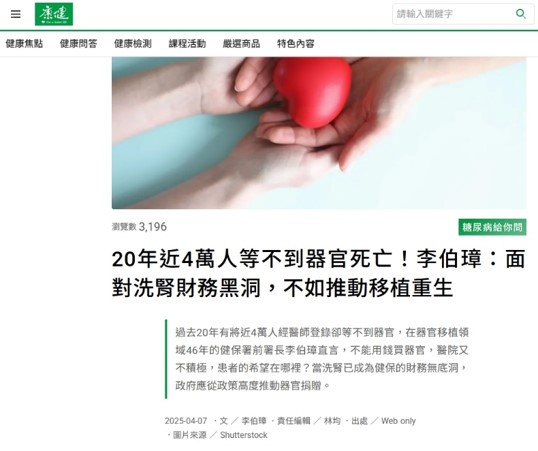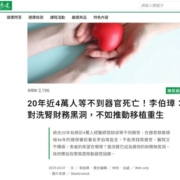【Column article】CommonHealth“Nearly 40,000 People Died Waiting for Organs Over 20 Years! Lee Po-Chang: Instead of Facing the Financial Black Hole of Dialysis, Promote Transplantation for a New Life”

Kidney Transplant Patient:
“Good evening, Dr. Lee. Tomorrow, March 25, marks an important rebirth day for me — my 16th transplant anniversary. Time really flies! I want to express my heartfelt gratitude for your care over the years, and wish you peace, health, and all the best!”
Me:
“Blessings! Keep going strong! Which doctor is following up with you now? What grade is your child in? Is your career going well?”
Kidney Transplant Patient:
“I’m still going back to Dr. Chang at Cheng Kung University Hospital for follow-ups. My child is growing up so fast! As for work, it’s going okay. With business expanding, the challenges at work are also getting bigger. It’s just that it’s really hard to find good manpower these days, but I guess that’s true across all industries. Another concern is that as I get older, my body is starting to struggle with the workload — that’s what worries me the most.”
Just a few short lines of conversation reveal the deep bond between doctor and patient in transplant medicine — like family, accompanying each other through life’s challenges.
He is an architect who studied at Columbia University in the United States and returned to Taiwan. Back then, his father wanted to donate a kidney to him, but crossmatch testing revealed a positive antigen-antibody reaction, making the transplant contraindicated. No doctor in southern Taiwan was willing to perform the surgery.
I told him that over time, as his antibodies diminished or disappeared, we could reconsider — adopting a “wait and see” approach. He was still very young then and seemed to have lost hope for his future. I still remember, during a clinic visit, he grabbed my white coat and asked me if I would perform the surgery.
But this was a surgery full of uncertainties. If hyperacute rejection occurred, the transplanted kidney would immediately turn black and lose function — such a failure would be hard to forgive.
Later, I used plasma exchange and biological agents to adjust his antibodies and successfully completed the transplant. The patient has forever remembered the day of his rebirth, and for me, it was also a moment of growth in my abilities.
A New Organ, A New Life
In the blink of an eye, I have persisted in the field of transplantation for 46 years, performing over a thousand kidney transplant surgeries. Among my patients are those who received organs from selfless donors and those who received organs from family members. Together with them and their families, I have faced the hardships and joys that life brings. Having witnessed countless stories of life and death, every fragment of these experiences has constantly driven me to dedicate myself to advancing transplantation medicine in Taiwan. Helping more people understand transplantation has always been my unwavering goal.
In fact, for patients suffering from organ failure, receiving a healthy organ can mean a second chance at life. I once had a patient with end-stage renal disease who, at the age of 68, was fortunate enough to undergo a kidney transplant. He regained his health and lived another 18 years. Some might think that at such an old age, he had already lived long enough, but for his family, as long as there was a chance for him to survive, giving up was never an option.
The true goal of transplantation is to allow transplant recipients to live well and live long — to embrace their rebirth! While organs from family members can sometimes be arranged, creating more opportunities for transplantation through organs donated by unrelated individuals requires the government to recognize the importance of value-based healthcare. Making transplantation accessible to disadvantaged patients with organ failure is an urgent issue that the government must face pragmatically.
In recent years, Taiwan’s healthcare mainstream has focused heavily on precision cancer treatment, aiming to extend patients’ lives. Illness is a part of life — some diseases can be treated with medication, but others, such as liver, heart, or lung failure, leave patients reliant on ECMO or ventilators in intensive care units. Sadly, many patients who urgently need heart, liver, or lung transplants pass away while still waiting for a chance that never comes.
More People Waiting for Transplants Are Unable to Get a Chance
Patients with kidney failure can survive by undergoing dialysis three times a week, but their quality of life cannot compare to that of patients who have received a kidney transplant.
By examining the data registered by physicians at the Taiwan Organ Registry and Sharing Center over the 20-year period from 2005 to 2024, we can observe the proportion of patients waiting for transplants who successfully received a transplant versus those who never got the opportunity.
| 有接受移植 | 沒有移植機會 | |
| 心臟 | 1,399人 | 2,425人 |
| 肝臟 | 7,388人 | 10,729人 |
| 肝臟(肝癌) | 2,011人 | 2,683人 |
| 腎臟 | 5,437人 | 23,072人 |
| 肺臟 | 240人 | 542人 |
The Significant Survival Difference Between Those Who Receive Transplants and Those Who Do Not
There is a statistically significant difference in long-term survival rates between patients who have the opportunity to undergo transplantation and those who do not. Yet perhaps no one truly cares that these people—who should not have died—pass away quietly, while their families can only helplessly accept the reality.
In Western countries, organ donation and transplantation are treated as important national endeavors, actively promoted with government support. From my perspective, it is heartbreaking that patients who could be reborn through transplantation are left waiting endlessly. In Taiwan, they cannot buy organs with money, and if the hospitals where they registered are not proactive in promoting organ donation, where does their hope lie? Advancing organ transplantation requires a proactive government that prioritizes policies in the best interest of the public. More importantly, transplant medicine must be driven by collective societal efforts.
In Taiwan, around 12,000 new dialysis patients are added each year, with National Health Insurance (NHI) expenditures reaching 69.66 billion points. As of 2023, there were 97,262 patients undergoing long-term dialysis. The massive cost of dialysis, which only treats the symptoms, inevitably strains the total NHI budget and squeezes funding for other medical services. Yet government officials and many healthcare workers fail to understand the financial black hole that long-term dialysis creates, nor do they fully grasp the true medical value of organ transplantation.
Organ transplantation is an extremely demanding medical undertaking. Donation and transplant surgeries often take place during holidays or late at night, significantly impacting the personal lives of surgeons, making it even more difficult to cultivate new talent.
In Taiwan, there are strict standards for surgeons and hospitals that perform organ transplantation. However, many younger-generation doctors and hospitals who are qualified and capable of performing transplant surgeries are not actively participating. Whose responsibility is this? Is it the government’s? Or is it due to a lack of sufficient incentives for physicians? Regardless of the reason, the ultimate victims are the helpless patients.
You Must Give to Receive: Leaving Health Is Better Than Leaving Wealth
Over the years, in promoting the cause of altruistic organ donation, I have witnessed many healthcare workers, ICU staff, neurosurgeons, social workers, and transplant coordinators break away from traditional norms to push this movement forward. Convincing a family to consent to organ donation at the moment their loved one is declared brain-dead is incredibly difficult work. Yet only through communication and dialogue can we hope to help patients—people we have never met—who are desperately waiting for an organ transplant. This emotional burden is something that most healthcare workers, the general public, and even government officials can hardly comprehend.
In contrast to Singapore’s “opt-out” system—where individuals are presumed willing to donate unless they have explicitly declined—Taiwan, considering the local cultural views on life and death, introduced the “Sacrifice and Reward” policy. Under this policy, if someone becomes an altruistic organ donor, their spouse and blood relatives within three degrees of kinship will be given priority should they one day require an organ transplant themselves. This is a world-first initiative.
So far, 45 patients with organ failure have been given priority to receive life-saving organ transplants because their family members had previously donated organs. This highlights that what altruistic organ donors leave behind for their descendants is not merely material wealth, but an invaluable treasure of health. It also embodies the spirit of “you must give to receive.”
Master Cheng Yen of Tzu Chi once taught: “A clever person clings tightly to gain and loss, while a wise person is courageous enough to let go.”
The Transplantation Society has called on all countries to ensure that organ donations come from their own citizens, strongly prohibiting donations from executed prisoners and banning the practice of traveling to third countries for commercial living donor transplants. Taiwan’s related laws and regulations are already quite comprehensive. The Ministry of Health and Welfare and the National Health Insurance Administration should adopt forward-thinking strategies to plan and allocate medical resources properly, which would truly benefit the people.
President Lai Ching-Te, who has a background as a nephrologist, was deeply supportive of altruistic organ donation initiatives when he served as Mayor of Tainan. I am grateful for his efforts back then and hope to once again have his blessing and support.
Thanks to the charitable sponsorship of the Fubon Group, a two-minute organ donation promotional video titled “As Long As I Am Willing, Love Can Continue” was produced and is now freely licensed for broadcasting in healthcare institutions across Taiwan.
I firmly believe that “Nothing in the world is difficult if you have the heart for it.”
Organ donation is a profoundly meaningful life lesson — it not only creates the continuation of another life but also allows love to extend infinitely.
Original Source:https://www.commonhealth.com.tw/blog/6146



